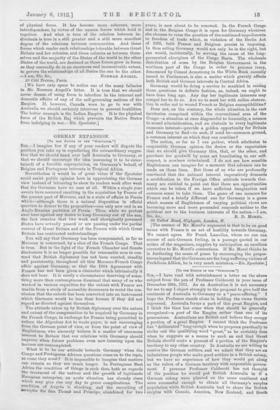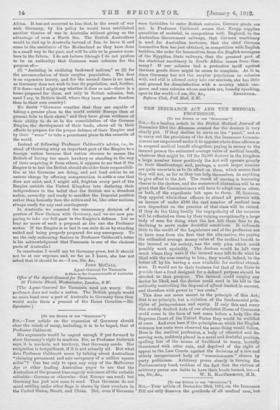[To THE EDITOR OE THE "SPECTATOR:] Sin, — I have read with
astonishment a letter on the above subject from the pen of Professor Caldecott in your issue of December 29th, 1911. As an Australian it is not necessary for me to say I object strongly to the proposal to give half the continent of Australia to Germany as a " peace-offering." I hope the Professor stands alone in holding the views therein expressed. Australia forms a part of this great Empire, and I think the time has come when that should be generally recognized—a part of the Empire rather than one of its possessions. Australians are British and believe they occupy a portion of a great Empire. I cannot think the Professor has " deliberated " long enough when be proposes practically to strike out the qualifying word "great," as he certainly does when be suggests as a means to such an end that Great Britain should make a present of a portion of the Empire's territory to any other country. In Australia we are willing to receive the German settlers, and we admit that they are an industrious people who make good settlers in a British colony, but we have no experience of how they would get along as the rulers of a German territory with responsible govern- ment. I presume Professor Caldecott has not thought of the position he would put British Australia in if a German colony were planted on the same continent and were successful enough to obtain all Germany's surplus population while British Australia had to share the British surplus with Canada, America, Now Zealand, and South Africa. It has not occurred to him that, in the event of war with Germany, by his policy he would have established another theatre of war in Australia without giving us the advantage of even a North Sea. The British Australians would be tied up in Australia instead of free to leave it and come to the assistance of the Motherland as they have done in a small way in the past, and will be able to in greater nurn- hers in the future. I do not believe (though I do not profess to be an authority) that Germans want colonies for the purpose of—
(1) " Assisting in civilizing backward nations," or (2) for the accommodation of their surplus population. The first is an expensive luxury, and for the second there is no need, as Germany does not wish to lose its population, and, further, if it does—and I might any whether it does or not—there is a home prepared for them, not only in British colonies, but, need I say, in Britain itself, where they have greater freedom than in their own country!.
No doubt " Germans consider that they are capable of taking a greater place in the world outside Europe than at present falls to their share," and they have given evidence of their ability to do so in the consolidation of the German Empire, the development of their trade, above all in their efforts to prepare for the proper defence of their Empire and by their "arms" to take a prominent place in the councils of the world.
Instead of following Professor Caldecott's advice, i.e., in- stead of throwing away an important part of the Empire to a foreign nation because that nation chooses to accuse the British of having too much territory or standing in the way of their acquiring it from others, it appears to me that if the Empire is to last the British should shoulder their responsibili- ties as the Germans are doing, and not lend colour to an untrue charge by offering compensation to settle a case that does not exist, and, I might add, frighten every part of the Empire outside the United Kingdom into declaring their independence in the belief that the British are a decadent nation, cowardly and ready to sacrifice the Imperial position rather than honestly face the critics and be, like other nations, always ready for any real contingency.
In Australia we resented the unnecessary division of a portion of New Guinea with Germany, and we are now pre- paring to take our full part in the Empire's defence. Let us bear no more of such a proposal as the one the Professor makes. If the Empire is to last it can only do so by standing united and being properly prepared for any emergency. To me the only redeeming feature in Professor Caldecott's letter is his acknowledgment that Tasmania is one of the choicest parts of Australia!
In conclusion I would say let Germany grow, but it should not be at our expense, and, so far as I know, she has not asked that it should be so.—I am, Sir, &a, JOHN MCCALL, Agent-General for Tasmania
(a State in the Commonwealth of Australia) Office of the Agent-General for Tasmania, 66 Victoria Street, Westminster, London, S.W.
The Agent-General for Tasmania need not worry. One professor does not make a nation. The British people would no more hand over a part of Australia to Germany than they would make them a present of the Home Counties.—En. Spectator.]



















































 Previous page
Previous page